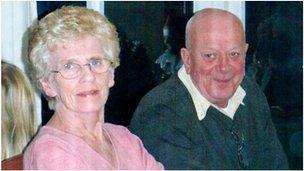Ruling in Addenbrooke's Hospital 'no resuscitation' case
- Published

Janet Tracey was being treated at Addenbrooke's Hospital in Cambridge
A woman with a broken neck and cancer was not informed or involved in a decision to put a "do not resuscitate" notice in her records, a high court judge has ruled.
But Mrs Justice Nicola Davies said medical staff acted professionally and in the best interest of Janet Tracey.
Mrs Tracey, 63, died at Addenbrooke's Hospital, Cambridge, in March 2011.
Her husband David says the notice was put on unlawfully, which the Cambridge University Hospitals Trust denies.
Mrs Justice Davies found a second notice, which followed three days afterwards and two days before Mrs Tracey's death, was put in place with the agreement of her family, who were unwilling to speak to her about it.
'Badgered' over resuscitation
The judge, who was determining disputed issues of fact, will rule on Friday whether the legal issues should now be considered at a judicial review hearing in February, which would also involve the Secretary of State for Health.
Lawyers for Mrs Tracey's family said this would clarify whether there is a legal duty to inform patients with capacity whether a DNR has been placed on their notes.
Mrs Tracey, a care home manager, died following a transfer to Addenbrooke's Hospital after breaking her neck in a car crash on 19 February - two weeks after being diagnosed with terminal lung cancer.
The first notice, on 27 February, was cancelled on 2 March, while a second was imposed on 5 March, two days before she died.
Her husband, a retired engineer, said his wife believed she was being "badgered" into making a decision about resuscitation options.
But Cambridge University Hospitals NHS Foundation Trust has said the claims are unsound and unfair.
It said cardiopulmonary resuscitation would have been wholly inappropriate and not in the best interests of Mrs Tracey, who also had pneumonia and required ventilation.
Mrs Justice Davies said the failure to inform or involve Mrs Tracey had "minimal causative effect", as the notice was cancelled five days later when her family objected.
- Published7 November 2012
- Published5 November 2012